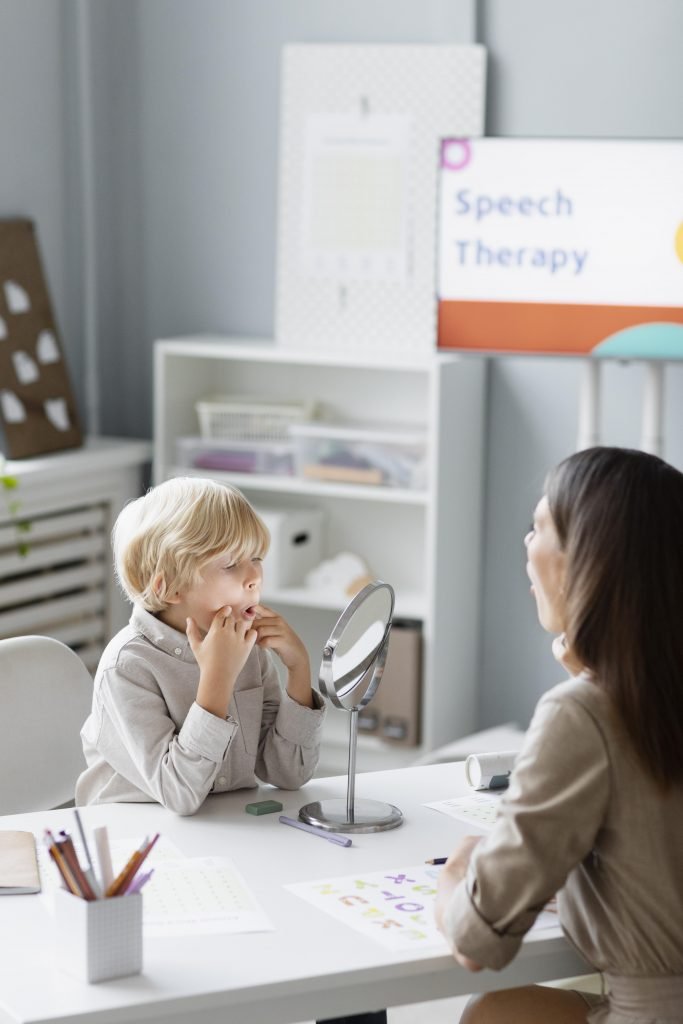Services
What is speech therapy
Speech therapy, also known as speech-language therapy, is the treatment of communication and swallowing disorders in individuals of all ages. It is a type of rehabilitation that helps individuals improve their speech and language abilities, including their ability to produce sounds, use language effectively, and understand and use language for communication. Speech therapy may also help individuals who have difficulty with swallowing or eating.
Speech-language pathologists (SLPs) are trained professionals who provide speech therapy. They assess and diagnose communication and swallowing disorders, develop treatment plans, and provide therapy to individuals with these disorders. Speech therapy may involve working with individuals one-on-one or in a group setting, and may include exercises, activities, and strategies designed to improve specific speech and language skills.
Speech therapy can benefit individuals of all ages, including children with speech and language delays or disorders, and adults with conditions such as stroke, brain injury, dementia, or Parkinson’s disease. The goal of speech therapy is to help individuals improve their communication abilities and to help them live more fulfilling and independent lives.
Our process
1. Initial Evaluation
The first step in our speech therapy process is an initial evaluation. During this session, we will assess your child’s communication skills, including speech, language, and hearing. This evaluation will help us determine the best course of action for treatment.
2. Treatment planning
Once the initial evaluation is complete, we will develop a personalized treatment plan for your child. This plan will take into account your child’s unique needs and goals, and will outline the specific strategies and techniques that will be used during therapy.
3. Speech Therapy Sessions
Next, your child will begin regular speech therapy sessions with us. These sessions will be designed to help your child develop their communication skills, build their confidence, and make progress towards their goals.
4. Ongoing Assessment
Throughout the course of treatment, we will regularly assess your child’s progress and make any necessary adjustments to their treatment plan. This ongoing assessment ensures that your child is receiving the most effective care possible.
5. Graduation
Once your child has met their goals, they will graduate from speech therapy. We will provide you with resources and strategies to continue supporting your child’s development, and we will be here if you need us in the future.
Areas we work
Receptive & Expressive language delay
Receptive and expressive language delays are common language disorders that can affect individuals of all ages. Receptive language refers to the ability to understand spoken or written language, while expressive language refers to the ability to use language to express thoughts, ideas, and emotions.
Receptive language delays can lead to difficulties in understanding instructions, following conversations, and comprehending written or spoken language. Individuals with receptive language delays may also have trouble following directions, answering questions, and processing information.
Expressive language delays can result in difficulties in communicating thoughts, ideas, and emotions effectively. Individuals with expressive language delays may have difficulty speaking in complete sentences, using appropriate grammar, or finding the right words to express themselves.
If your child or a loved one is struggling with receptive or expressive language delays, speech therapy can be a highly effective treatment option. A speech-language pathologist (SLP) will assess your child’s language abilities and develop a customized treatment plan to address their specific needs. This may include exercises and activities designed to improve language comprehension, expression, and overall communication skills.
With the help of speech therapy, individuals with receptive and expressive language delays can make significant improvements in their language abilities, leading to improved communication and enhanced quality of life. Contact talking cow speech therapy today to learn more about how we can help.

Pronunciation errors
Articulation errors refer to difficulties with producing sounds correctly, which can result in speech that is hard to understand. These errors are common in children, but can also occur in adults. Some common types of articulation errors include:
- Substituting one sound for another, such as saying “wabbit” for “rabbit”
- Omitting sounds, such as saying “tat” for “cat”
- Distorting sounds, such as saying “thith” for “this”
- Adding extra sounds, such as saying “shshsh” for “shoes”
Articulation errors can affect a child’s ability to communicate effectively and can impact their social, academic, and emotional development. If a child has difficulty with articulation, it’s important to seek support from a speech-language pathologist.
Speech therapy can help children improve their articulation skills. During therapy, a speech-language pathologist will work with the child to identify the specific sounds they are having difficulty with and develop a treatment plan to address these sounds. This may involve activities such as sound drills, using props, and incorporating fun and engaging games to help the child learn and practice the correct sounds.
In addition to working with the child, the speech-language pathologist may also provide support and guidance to parents and teachers to help them understand how they can support the child’s progress at home and in the classroom.
By highlighting articulation therapy, you can help families understand the importance of addressing articulation errors and how speech therapy can help. You can also reassure families that with the right support, their child can improve their speech and communication skills, which will have a positive impact on their overall development and success. To learn more or your loved ones has pronunciation or articulation errors, contact TalkingCow speech therapy.

Fluency therapy
Fluency therapy focuses on helping individuals overcome stuttering or other fluency disorders. Fluency disorders are characterized by disruptions in the smooth and effortless flow of speech, and can impact an individual’s ability to communicate effectively.
Speech-language pathologists use a variety of strategies and techniques to help individuals with fluency disorders improve their speech. Some common fluency therapy strategies include:
Stuttering modification: This approach focuses on teaching the individual to speak in a more relaxed and natural way, reducing the physical tension and struggle that can be associated with stuttering.
Cognitive behavioral therapy: This approach addresses negative thoughts and feelings about speaking, helping the individual to develop a more positive and confident attitude towards speaking.
Breath control and relaxation techniques: These techniques help individuals to regulate their breathing and reduce physical tension, which can improve fluency.
Fluency shaping: This approach focuses on teaching the individual to speak in a more regular and consistent manner, helping to improve the overall flow of speech.
Prolonged speech: This technique involves speaking in a slow and exaggerated manner to help the individual gain control over their speech and improve their fluency.
Speech therapy for fluency disorders is an individualized process, and the specific strategies used will depend on the individual’s needs and goals. A speech-language pathologist will work with the individual to develop a customized treatment plan that is tailored to their specific needs and goals.

Image by Freepik
Autism spectrum disorders
Autism Spectrum Disorders (ASD) are a group of neurodevelopmental conditions characterized by difficulties with social interaction, communication, and repetitive behaviors. Individuals with autism may also have unique strengths, interests, and talents.
ASD is a spectrum disorder, meaning that it affects individuals differently, and to varying degrees. Some individuals with autism may have difficulty with communication, while others may have exceptional language abilities. Some individuals may engage in repetitive behaviors, while others may have exceptional memory or problem-solving skills.
Speech-language pathologists play a crucial role in helping individuals with autism improve their communication and social skills. Some common therapy strategies for autism include:
Social skills training: This approach focuses on teaching individuals with autism the social skills necessary for effective communication and interaction, such as eye contact, turn-taking, and conversation skills.
Communication therapy: This approach focuses on improving an individual’s ability to understand and use language, including expressive language (the ability to express thoughts and ideas) and receptive language (the ability to understand language).
Behavioral therapy: This approach focuses on reducing challenging behaviors and teaching new skills through positive reinforcement.
Sensory integration therapy: This approach helps individuals with autism regulate their sensory experiences, which can improve their overall functioning and comfort in different environments.
Play-based therapy: This approach uses play and other fun activities to engage children with autism and help them develop social and communication skills.
It’s important to note that autism is a complex disorder, and therapy is an individualized process. The specific strategies used will depend on the individual’s needs and goals, and a speech-language pathologist will work with the individual and their family to develop a customized treatment plan.

Reading comprehension
Reading comprehension is an important aspect of language development and communication. It refers to the ability to understand and interpret written text, including the ability to make inferences, identify main ideas, and understand cause-and-effect relationships.
Reading comprehension difficulties can arise for a variety of reasons, including language delays, learning disabilities, attention deficits, and more. These difficulties can impact an individual’s ability to succeed in school and in their daily life.
Speech therapy can play a key role in improving reading comprehension skills. Speech-language pathologists (SLPs) are trained to assess and treat language and literacy difficulties, including difficulties with reading comprehension.
During speech therapy, the SLP may work with the individual to improve their language and vocabulary skills, as well as their understanding of language structure and grammar. The SLP may also use strategies such as visual aids, story retelling, and summarization to help the individual improve their reading comprehension skills.
With the help of speech therapy, individuals can make significant progress in their reading comprehension skills, leading to improved academic performance and enhanced quality of life. Contact TalkingCow Speech therapy today to learn more about how we can help improve your reading comprehension skills.

Spelling
Spelling is a crucial aspect of language development and effective communication. It refers to the ability to accurately spell words, both orally and in written form. Good spelling skills are essential for academic success, as well as for effective communication in the workplace and in daily life.
Spelling difficulties can arise for a variety of reasons, including language delays, learning disabilities, attention deficits, and more. These difficulties can impact an individual’s ability to succeed in school and in their daily life.
Speech therapy can play a key role in improving spelling skills. Speech-language pathologists (SLPs) are trained to assess and treat language and literacy difficulties, including difficulties with spelling.
Spelling therapy may involve the following components:
Phonology: SLPs may teach children to associate sounds with letters and letter combinations, which is an essential step in learning to spell.
Vocabulary: SLPs may teach children new words and help them to understand the meanings of words, which is important for improving spelling skills.
Sight Words: SLPs may help children learn to recognize high-frequency words that are frequently used in reading and writing.
Structural Analysis: SLPs may teach children how to analyze words and break them down into smaller units, such as prefixes, suffixes, and roots.
Visual Memory: SLPs may help children improve their visual memory skills by teaching them to associate words with pictures or mental images.
Writing Practice: SLPs may encourage children to practice writing words, sentences, and paragraphs, which helps to reinforce spelling skills and improve writing fluency.
During speech therapy, the SLP may use a variety of techniques and strategies to help the individual improve their spelling skills. These may include phonics-based instruction, visual aids, word lists, and more. The SLP may also address underlying language and phonemic awareness skills that may impact an individual’s spelling abilities.
With the help of speech therapy, individuals can make significant progress in their spelling skills, leading to improved academic performance and enhanced quality of life.

